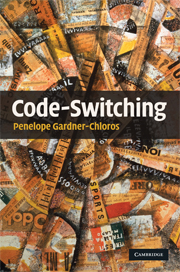Crossref Citations
This Book has been
cited by the following publications. This list is generated based on data provided by Crossref.
Angermeyer, Philipp Sebastian
2010.
Interpreter-mediated interaction as bilingual speech: Bridging macro- and micro-sociolinguistics in codeswitching research.
International Journal of Bilingualism,
Vol. 14,
Issue. 4,
p.
466.
Herring, Jon Russell
Deuchar, Margaret
Couto, M. Carmen Parafita
and
Quintanilla, Mónica Moro
2010.
‘I saw the madre’: evaluating predictions about codeswitched determiner-noun sequences using Spanish–English and Welsh–English data.
International Journal of Bilingual Education and Bilingualism,
Vol. 13,
Issue. 5,
p.
553.
2011.
A Companion to the Latin Language.
p.
582.
Amberber, Amanda Miller
2011.
Adapting the Bilingual Aphasia Test to Rarotongan (Cook Islands Maori): Linguistic and clinical considerations.
Clinical Linguistics & Phonetics,
Vol. 25,
Issue. 6-7,
p.
601.
SEARGEANT, PHILIP
and
TAGG, CAROLINE
2011.
English on the internet and a ‘post‐varieties’ approach to language.
World Englishes,
Vol. 30,
Issue. 4,
p.
496.
CENOZ, JASONE
and
GORTER, DURK
2011.
Focus on Multilingualism: A Study of Trilingual Writing.
The Modern Language Journal,
Vol. 95,
Issue. 3,
p.
356.
BHATT, RAKESH M.
and
BOLONYAI, AGNES
2011.
Code-switching and the optimal grammar of bilingual language use.
Bilingualism: Language and Cognition,
Vol. 14,
Issue. 4,
p.
522.
Tien, Nguyen Quang
2012.
English-Vietnamese Code-Switching in Tertiary Educational Context in Vietnam.
Asian Englishes,
Vol. 15,
Issue. 2,
p.
4.
LEIMGRUBER, JAKOB
2012.
Singapore English: An indexical approach.
World Englishes,
Vol. 31,
Issue. 1,
p.
1.
Poplack, Shana
and
Dion, Nathalie
2012.
Myths and facts about loanword development.
Language Variation and Change,
Vol. 24,
Issue. 3,
p.
279.
Schendl, Herbert
2012.
The Handbook of Historical Sociolinguistics.
p.
520.
Seargeant, Philip
Tagg, Caroline
and
Ngampramuan, Wipapan
2012.
Language choice and addressivity strategies in Thai‐English social network interactions.
Journal of Sociolinguistics,
Vol. 16,
Issue. 4,
p.
510.
Sachdev, Itesh
Giles, Howard
and
Pauwels, Anne
2012.
The Handbook of Bilingualism and Multilingualism.
p.
391.
Berthele, Raphael
2012.
The influence of code-mixing and speaker information on perception and assessment of foreign language proficiency: An experimental study.
International Journal of Bilingualism,
Vol. 16,
Issue. 4,
p.
453.
Tagg, Caroline
and
Seargeant, Philip
2012.
Writing systems at play in Thai-English online interactions.
Writing Systems Research,
Vol. 4,
Issue. 2,
p.
195.
Sakel, Jeanette
2012.
Transfer and language contact: the case of Pirahã.
International Journal of Bilingualism,
Vol. 16,
Issue. 1,
p.
37.
Wei, Li
2012.
The Encyclopedia of Applied Linguistics.
Wei, Li
2012.
The Handbook of Bilingualism and Multilingualism.
p.
26.
Deuchar, Margaret
2012.
The Encyclopedia of Applied Linguistics.
Wodak, Ruth
Krzyżanowski, Michał
and
Forchtner, Bernhard
2012.
The interplay of language ideologies and contextual cues in multilingual interactions: Language choice and code-switching in European Union institutions.
Language in Society,
Vol. 41,
Issue. 2,
p.
157.





